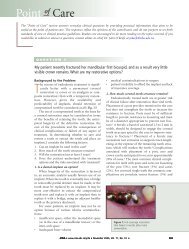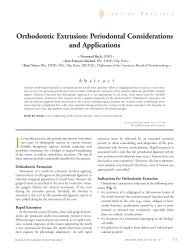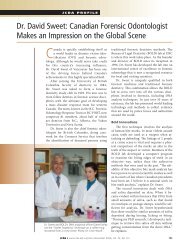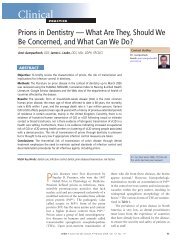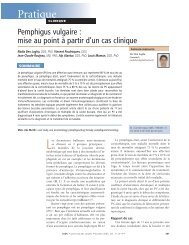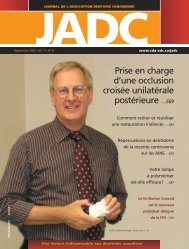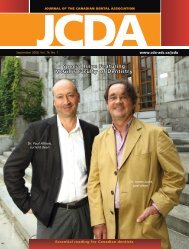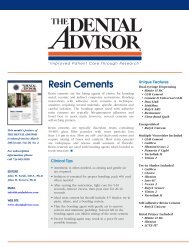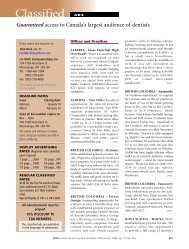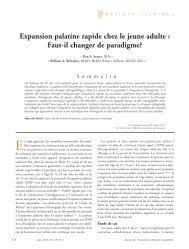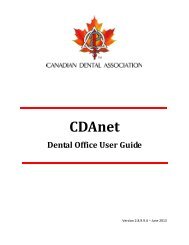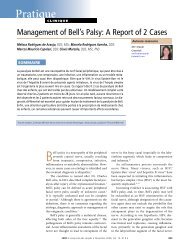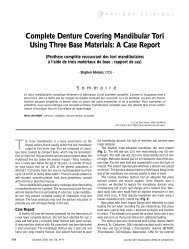JCDA - Canadian Dental Association
JCDA - Canadian Dental Association
JCDA - Canadian Dental Association
Create successful ePaper yourself
Turn your PDF publications into a flip-book with our unique Google optimized e-Paper software.
Dramatic improvements in tooth retention by<br />
adults have been reported in a number of adult<br />
dental health surveys in industrialized countries.<br />
The prevalence of edentulousness has decreased, but many<br />
older adults remain edentulous. This article reviews recent<br />
literature on the outcomes of edentulousness and complete<br />
denture therapy.<br />
One well-documented consequence of tooth loss is<br />
resorption of the residual alveolar ridge. Despite extensive<br />
research, reasons for inter-patient variation in the rate and<br />
extent of bone loss remain unclear. This variation is likely<br />
related to both local and systemic factors. Loss of alveolar<br />
ridge, particularly in the mandible, can lead to instability of<br />
complete replacement dentures, poor appearance and<br />
discomfort. Loss of teeth also compromises ability to chew<br />
food and thus may impair food choice. Objective assessment<br />
of masticatory performance indicates that chewing is<br />
substantially compromised by tooth loss. In studies evaluating<br />
the effects of new, optimal dentures, masticatory<br />
performance and masticatory ability were not significantly<br />
improved. Results of objective and subjective assessments<br />
were only moderately correlated. These results have implications<br />
for treatment planning and indicate a need for a<br />
standardized index of chewing efficiency. However, it<br />
should not be assumed that poor diet is simply a direct<br />
result of tooth loss. Factors such as socio-economic status,<br />
education and food preference also play a major role in diet.<br />
Nonetheless, research has shown that edentulous adults<br />
have a poor-quality diet that is low in fibre. This has longterm<br />
health implications.<br />
662 November 2003, Vol. 69, No. 10<br />
C L I N I C A L P R A C T I C E<br />
A Review of the Functional and Psychosocial<br />
Outcomes of Edentulousness Treated with<br />
Complete Replacement Dentures<br />
• Patrick Finbarr Allen, BDS, PhD, MSc, FDS RCPS •<br />
• Anne Sinclair McMillan, BDS, PhD, FDS RCPS, FDS RCS(Ed) •<br />
A b r i d g e d V e r s i o n<br />
The complete article can be viewed on the e<strong>JCDA</strong> Web site at: http://www.cda-adc.ca/jcda/vol-69/issue-10/662.html<br />
© J Can Dent Assoc 2003; 69(10):662<br />
This article has been peer reviewed.<br />
Many adults develop the skills required to overcome and<br />
eventually accept limitations of dentures. However, some<br />
patients do not cope well with the loss of natural teeth and<br />
are classed as “maladaptive.” The broader issue of handicap<br />
associated with edentulousness has not received as much<br />
attention in the literature. This domain of health is difficult<br />
to measure, and requires expertise beyond the dental<br />
disciplines. Some studies have used psychological assessment<br />
measures to assess patient acceptance of complete<br />
dentures, but no convincing association was described.<br />
These measures are not developed for use as oral health<br />
status measures and are unlikely to have fully captured the<br />
impact of tooth loss and denture-wearing problems.<br />
Qualitative studies have probed into the impact of tooth<br />
loss on quality of life. Common themes that emerged from<br />
these interviews were feelings of bereavement, lowered selfconfidence,<br />
altered self-image, dislike of appearance,<br />
inability to discuss this taboo subject, concern about<br />
dignity, behaving in a way that keeps tooth loss secret,<br />
altered behaviour in socializing and forming close relationships,<br />
and premature aging.<br />
Research into the outcomes of total tooth loss and<br />
complete denture therapy has been hampered by lack of<br />
randomized clinical trials, questionable use of statistical<br />
tests and failure to include comparable control groups. The<br />
current evidence base needs to be supplemented with<br />
stronger evidence from a more rigorous study design, which<br />
will lead to a better understanding of the outcomes of tooth<br />
loss and complete denture therapy. C<br />
Journal of the <strong>Canadian</strong> <strong>Dental</strong> <strong>Association</strong>



